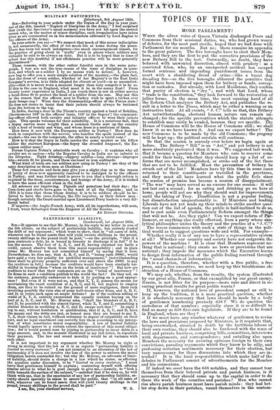MILITARY EQUIPMENT8.
Edinburgh, 9th August 1854. Bra—Referring to your article imder the Topics of the Day in your jour- nal of the 6th, headed "Neglect of Discipline in the Army," I feel surprised that (with the Spectator's usual acumen) you have not hit upon the correct reason why, in the matter of minor discipline, such irregularities have taken place as are commented on in the memorandum addressed by Lord Raglan to the officers of the Army. In your article you say—" We suspect that much of this minor indiscipline is, not unnaturally, the effect of too much life at home during the peace. There has been too much indulgence—too much encouragement almost, for the practice of going about in'multi' even in places where soldiers may virtually be said to be always on duty. But it is to be hoped that in time of actual war this doubtful if not effeminate practice will be more generally discontinued." These reasons, with the other rather fanciful ones in the same para- graph, I fear are not the true causes of the want of discipline in ques- tion, and which as a soldier I by no means wish to defend. I, however, now beg to offer you a more simple solution of the mystery,—the plain fact, that the dress of every soldier, whether of her Majesty's or the East India Company's service, is so little adapted for climate or work—is so uncomfort- able—that it is never worn a moment longer than duty compels it to be so. If this is the case in England, what must it be in the sunny East ? From twenty years' experience in India, I can vouch there is not in either service a head-dress fit to protect the head of a soldier from the sun. May not this be the reason that the officers now in Turkey wish to sport a turban over their forage-cap ? What does the Commanding-officer of the Forces state ? He does not desire to insist that their jackets should always be buttoned from the bottom to the top.
In India, during a dour in the Nizam's country against a band of Bohillas, (thermometer 104° in the officers' tents, 110' in the Sepoys') the command- ing-officer allowed both cavalry and infantry officers to wear their jackets open. This speaks volumes for their suitability. It is a notorious fact, that a Sepoy carries more weight than a common Coolie sent up the country with a load of brandy and wine, and whose dress is a modicum of linen.
How fares it now with the European soldier in Turkey ? How does -he work in comparison with the navvie, who handles the spade instead of the musket—the one in the temperate, the other in nearly a torrid zone ? How is it that the Sepoy in India carries the same musket as his fellow soldier the stalwart European—the Sepoy the dreaded knapsack, the Eu- ropean soldier none?
Peruse Captain Nolan's admirable work on Cavalry : it explains why all cavalry are so useless—why the Regular Cavalry in India are so inferior to the Irregular. Tight dressing—slippery saddles—long stirrups—improper bits—swords fit for giants, and these enclosed in iron scabbards.
What kind of tents are our soldiers now using in Turkey ? are they of the same description as those seen at Chobham ?
These few remarks and facts may give you a slight clue as to the reason of laxity of dress now apparently resolved to be indulged in by the officers in Turkey, and 'may further tend to prove to you that a thorough reform is required in the dress, accoutrements, and tentage of the Army, if it is wished to have the same efficient when in the field.
All eciences are-improving. Pigtails and pomatum had their day; the Corn-laws and stocks have gone to the tomb of all the Capulets ; and in 1854 it is time that those whose destiny it is to be soldiers should be be- lieved to have the same feelings, the like impulses, as their fellow men : though certainly the Court-martial upon Lieutenant Perry leads to a very dif- ferent belief.
N'importe—the Anglo-French Army, with all its imperfections, will soon, I trust, wrest Sebastopol from the Emperor of All the Russias.
AN INDIAN OFFICER.


























 Previous page
Previous page